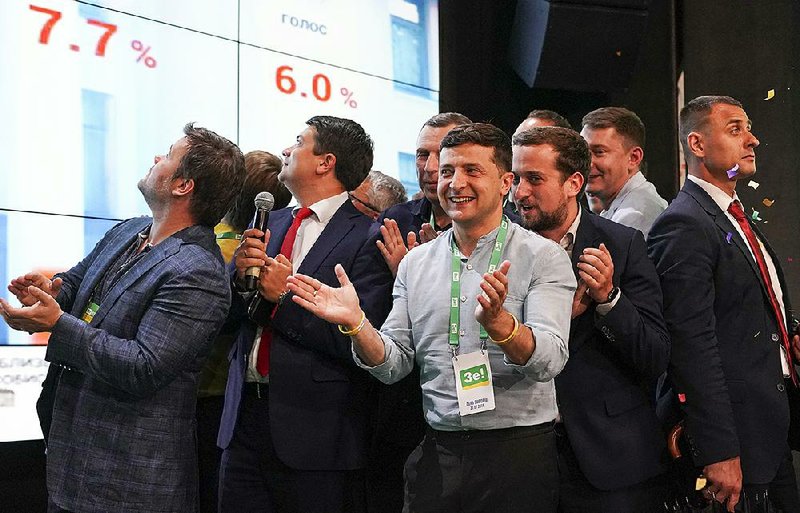MOSCOW -- Ukrainians voted Sunday in an early parliamentary election called by President Volodymyr Zelenskiy, a former comedian who was elected in April, as he seeks to strengthen his position in a country that has been at war with Russian-backed rebels for more than five years.
The vote count was proceeding slowly early today, with less than 1% of the polling stations' results tallied more than three hours after voting ended.
Zelenskiy, 41, has positioned himself as an outsider to Ukraine's ruling class, which many voters consider corrupt. During his presidential campaign, he promised an improvement in living standards and vowed to deliver a peaceful settlement of the conflict with separatists in eastern Ukraine.
Once in office, however, he discovered that his powers were hemmed in by lawmakers. When he tried to dismiss the foreign minister and the prosecutor general, for instance, the parliament refused to endorse the moves.
Speaking at a news conference in June, Zelenskiy said that the snap parliamentary election should "speed up the reboot of the Ukrainian political system that has been mired in corruption."
Zelenskiy is seeking enough support for his party, called Servant of the People, to form a government. The party is named after the television comedy in which Zelenskiy played a teacher who unexpectedly becomes president.
If Zelenskiy's party fails to win a majority, then it would probably look to form a coalition government. The most likely partners appear to be either a pro-European, center-right party led by rock star Sviatoslav Vakarchuk, or the populist party of former Prime Minister Yulia Tymoshenko.
The main parties running in opposition to Zelenskiy are the pro-Russian Opposition Bloc, and European Solidarity, the party of Zelenskiy's predecessor, Petro Poroshenko. The Opposition Bloc is led by Viktor Medvedchuk, an ally of Russian President Vladimir Putin.
Vladimir Fesenko, a political scientist who heads Penta, a research organization in Kiev, the Ukrainian capital, said there was "a high probability" that Zelenskiy's party would take control of the parliament.
"This will be in contrast to the current situation when the parliament blocks almost all of his initiatives," Fesenko said.
Olga Labinina, speaking outside a polling station in Kiev on Sunday, said she had voted for Zelenskiy's party because she hoped to see change in the country. The previous government "has betrayed our trust," Labinina, 50, said.
The Ukrainian parliament has 450 seats, with 225 elected from party lists according to the overall vote share and the rest chosen by district. After the annexation of Crimea by Russia in 2014 and because of the continuing conflict in eastern Ukraine, 26 election districts do not elect their representatives.
While Zelenskiy has cast himself as an alternative to the self-interested political factions that came before him, he has faced increased scrutiny about his connections to one of Ukraine's most powerful oligarchs, Ihor Kolomoisky. Kolomoisky owns the television network that has been buying content from Zelenskiy's production company. Zelenskiy has denied that his business connections with Kolomoisky go any further than that.
Nonetheless, the links have raised fears that a familiar story could be repeating. Since Ukraine's independence in 1991, oligarchs have exercised a vast influence over the country's politics.
Vadim Karasyov, a political scientist who heads the Institute of Global Strategies in Kiev, said that, with new members in the parliament, policy would likely be more centrist and less nationalist. But the oligarchs who have exerted disproportionate power over Ukraine, he said, will remain influential even after the parliamentary elections.
"There will be many new faces, but in terms of who rules over the country informally, things will remain the same," he said. "The overall course will be more centrist, the government will balance between Russia and the West and will attempt to direct its attention to internal affairs."
A Section on 07/22/2019
